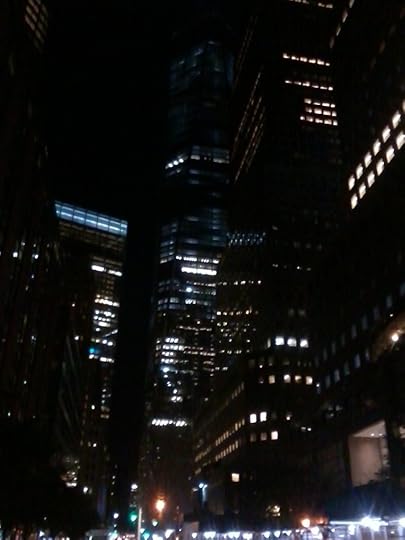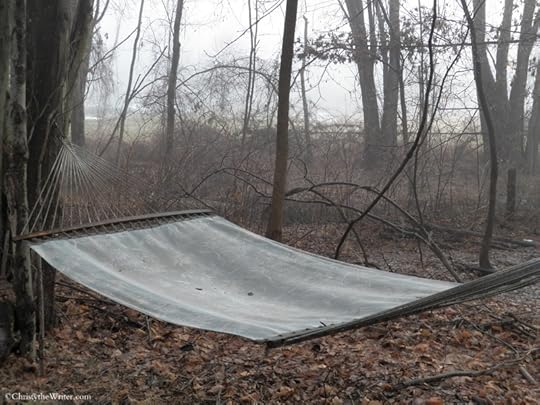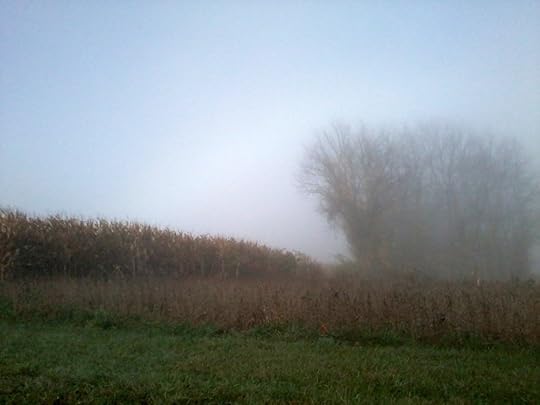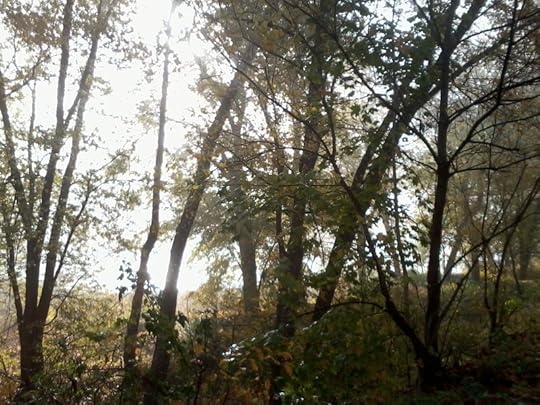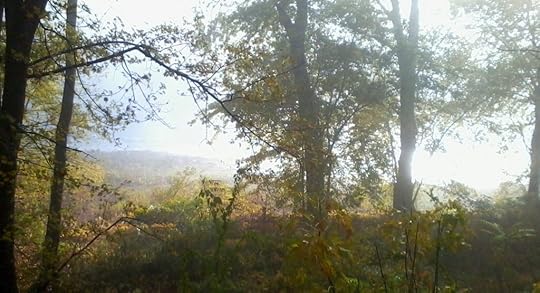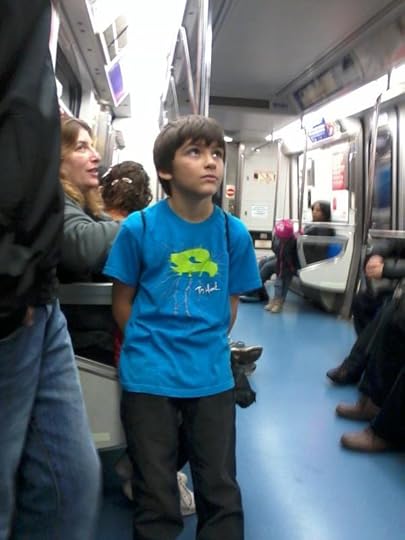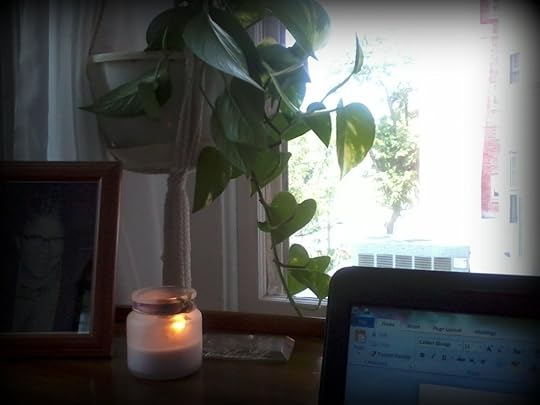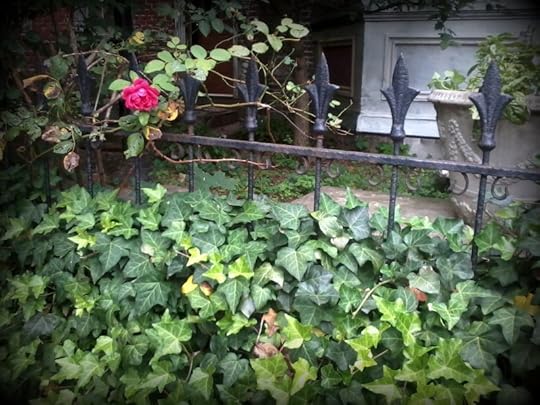Christy Potter's Blog, page 7
December 12, 2014
Christy’s Shorts: Insomnia
Zachary can’t sleep. Insomnia is rare for him, but when it decides to pay a visit, it stays awhile. Once his brain is used to waking up at a certain nonsensical and pointless hour, it keeps at it night after night. It’s persistent and annoying and there is nothing he can do but grit his teeth and wait it out, like a little kid kicking the back of his seat on a crowded airplane.
For lack of any better idea, he gets out of bed and wraps himself in his robe. The house is dark and heavy and he wanders aimlessly into the living room and sinks into a chair. Leaning his head back, he closes his eyes. Gradually the tension that has gathered in his back and shoulders from worrying about not sleeping ebbs away, and he melts into listening to the city.
Night sounds are nothing like day sounds. Common noises are magnified, out of context. The sound of tires on wet pavement cuts through the velvet silence at odd intervals. Others are out early, or maybe late, everyone at this hour a little private satellite of existence, everything focused inward with no one else around to help diffuse the crowding thoughts that press in, jockeying for space, trying to prioritize themselves but doing it badly.
During the day, the world feels enormous, bright and shiny, but daylight only shows you what the city wants you to see. Wide-eyed tourists, laughing children with brightly colored backpacks that make them look like happy turtles as they swarm to school, window boxes full of flowers, quality stores and clean sidewalks.
But at night, the sleeping city can’t hide its soul. Like a post-coital lover, it is defenseless, stripped of its accoutrements, drowsy and vulnerable. It’s then you can see a city for what it truly is. Dark, dripping alleyways, neon signs, cracked, flickering, struggling to stay awake, shadows and secrets slipping quietly out to play after the sun goes down.
Daylight joins people, a blanket of consciousness that’s thrown over everyone, making them aware of others whether they want to be or not. Stop for pedestrians in the crosswalk, wave to an acquaintance, hold the door, hand your money to the cashier, smile vacantly at a stranger, not sure what message you’re supposed to convey with that but feeling it’s your duty just the same. Maybe it’s nothing more than an acknowledgement that you see them. That they exist. That they are momentarily in the middle of your consciousness and so they matter. Awake in the middle of the night, no one feels they matter.
Outside the window, Zachary hears a worker, maybe two, unloading boxes from a truck and taking them into a nearby store. A morning delivery, scheduled so that shelves will be stocked and neat when customers arrive and they’ll never have to wonder how everything got there, about the night sounds that carried it all in, past Zachary sitting by his window in the dark. He can hear that the cardboard in the truck smells wet, the earthy cold odor of grocery store stock rooms and discarded pizza boxes.
He hears the lift gate buzz and clang shut, and the truck drives away. Voices bubble up from the street. A man laughs. A streak of orange and pink is beginning to seep through the curtains, and Zachary realizes he isn’t ready to let go of the night yet. He gets up quietly and goes back to bed, the city whispering to life behind him.
The post Christy’s Shorts: Insomnia appeared first on Christy The Writer.
December 2, 2014
Christy Writes: On Friendship and Letting Go
I don’t often write about my spiritual journey, mostly because I’m not one for sharing great heaving chunks of personal information with the masses, and also because I’m not a trained counselor or spiritual guide of any kind – just another person trying to keep her footing in a perpetually shifting world.
Lately, though, I’ve been focused on healing old hurts, letting go of the parts of the past that no longer serve my emotional and spiritual well-being, if they ever did. It’s a wrenching process, honestly, because a lot of that stuff is buried under spiritual ice. I can still see it, I know it’s there, but it’s tough to dig out. If I leave it there, though, I’ll always be able to see it, just under the surface.
My spiritual journey at this juncture is focused on friendships. Over the past few years I’ve shed a few people I thought would be lifelong friends (I’ve been both the shedder and the shedee), and I’ve made some truly wonderful new friends who support and nurture me in every way, and who allow me to give them that same beautiful gift.
During a recent morning meditation, when my mind was quiet and clear, I started to notice some of the same thoughts rising like soap bubbles. Memories of old friends – but not happy ones. I found myself wanting to replay again and again how and why the relationships ended, to wander through the broken bits and try to find the one piece that I could grab, hold up to the light, and finally understand why a friendship had crossed my path at all if it was just going to leave me sad.
Moments of clarity are funny things. They’re like big foamy waves that you don’t see coming up behind you until they crash over your head and leave you dripping wet and thinking, “Ohhhhhhh.” That moment for me came when I realized that each of the friendships I was still grieving (in my case there were three) had come into my life for a reason, and if I allowed myself to think about it honestly, that reason was to teach me something. About myself, about love, about every day and every moment I spend walking this planet.
So I started there. I spent some quiet time contemplating the friendship I’d had with each of these three women. I asked myself what I’d needed to learn that they had taught me. And once I opened my mind and my spirit to hearing that truth, it came to me. I meditated on that truth for awhile, and focused on the growth that had come about because of that friendship. I thanked God for bringing them into my life. And for the first time in a long time, I felt gratitude toward them. And with gratitude came peace.
I wrote each of them a note and thanked them for what their friendship had brought to my life. I received a wonderful note in response from one of them. The other two I haven’t heard from, and I won’t be surprised if I don’t. And that’s okay. I just needed them to know that I will always think of them now with love and light.
It wasn’t easy to write those notes, to be that vulnerable and open in front of someone with whom my relationship went spectacularly bad (Hey, I’m a writer, okay? I’m complicated.) but once I’d done it, I finally felt free to release the negative thoughts, and to open my spiritual hand and let the friendship go. And my spirit is finally, fully, at peace.
The post Christy Writes: On Friendship and Letting Go appeared first on Christy The Writer.
November 30, 2014
Christy with a Camera: Misty Morning
To awaken to early morning mist is to glimpse nature at her softest and most vulnerable, before she’s wiped the sleepy-dust from her eyes.
The post Christy with a Camera: Misty Morning appeared first on Christy The Writer.
November 17, 2014
Christy’s Shorts: Song of the Subway
It was interesting, she thought, how the subway worked.
Not the electricity of it, nor the detailed system of underground tunnels that spread out under the city like some kind of rat-filled, vibrating bedrock, not even how fast it moved. Those were engineering details that held no particular fascination for her. What she found interesting were the details inside the subway cars. Everyone at any given time who was riding the subway had one thing in common: they were going someplace else.
But didn’t that hold true of anyone she saw out and about, riding on a crosstown bus or in the back of a taxi? That was different. There was a freedom in getting around above ground, an openness. You could wave to people outside as the sunshine gathered extra warmth from the window glass before settling on your arms and your face. Hi guys! Look at me! On the bus! To walk down the steps into the rank-breathed mouth of the subway system was to surrender yourself to the underworld of the transportation industry. It was dark, dank, and moody, like the graduate student she once dated who chain smoked and wore turtlenecks and a beret non-ironically. To ride the subway was to make the conscious decision to step down, to where the only ones who could see you were the others who had made the same decision.
Yet she rode the subway every day. From the first day she’d moved to the city, she knew that her overpriced and undersized address in the village would only get her so far. If she wanted to be a real New Yorker, she had no choice but to step down. Taxis and buses were for tourists and locals who lacked imagination. The subway was for hard-core New Yorkers, who got on and off the trains with a bored expression, if they even looked up from their book at all, and never trailed a finger over the red or yellow lines on the map or strained to hear what the conductor said. They just knew. They always knew. Ask any New Yorker on the street what subway to take to Times Square, or Battery Park, or Junior’s Cheesecake, and they’d rattle it all off, including any place where you’d have to change trains, without hesitation.
Instead of finding this intimidating when she’d first moved to the city, she’d been intrigued. She wanted to learn this language, to crack their code. For awhile, it didn’t seem she ever would, but one day she found herself getting on the train and getting off four stops later without thinking about it. She’d become fluent when she wasn’t paying attention.
Riding the subway was hardcore. It was about getting from one place to another without seeing anything along the way apart from aged tiles flashing past in the cracked yellow light. Sometimes the cars were virtually empty, but during rush hour people were pressed together, feet fitting around each other like puzzle pieces, bodies bumping, hands jockeying for pole space, armpits swaying closer to faces than faces would be comfortable with in any other setting. But on the subway, it was just a fact of life. Even the times the train would abruptly stop and go dark, everyone shrugged and waited it out.
Coming up from the subway always made her feel like a mole, surfacing, blinking, trying to get her bearings and refamiliarize herself with everything she’d left behind just moments before. She’d jumped on a blind bullet that transported her to another part of the city and anyone who didn’t find that fascinating was, as far as she was concerned, missing a vital point the city was always trying to make about what it really is, underneath.
The post Christy’s Shorts: Song of the Subway appeared first on Christy The Writer.
November 12, 2014
Christy Writes: Licking the Now
I know I haven’t been posting much lately, and God bless those of you who have subscribed to my blog anyway, or checked back now and then to see what’s new, or forwarded a previous post to your friends, or bought one of my books. It eases the guilt twinges when I surface from my writing – blinking and looking I’m sure like what Nabokov had in mind when he described someone as looking “like an old tipsy witch” – and realize that you’re all still here. Reading. Waiting.
I’ve been writing, of course. Every day I spend either submerged in pushing forward the plot of my new book or going back to earlier chapters to edit and change things. As I’ve said before, this book is taking me places I never thought I’d be comfortable. I could have written another contemporary, light fiction novel like “Oh Brother,” or compiled another book of essays like “The World Was My Oyster But I Didn’t Know How to Cook.”
But here’s the thing – I don’t like to stick with the familiar, and even more than that, I don’t like to do what everyone else is doing. “Is that a good idea?” one of my friends asked me not long ago. “If everyone else is writing certain kinds of books, it’s because those are what’s selling.”
Meh. I guess.
But there’s no growth in that, at least not for me. I would rather take the road less traveled and see what happens. Will I trip and fall right on my big head? Maybe. But it’s possible I’ll succeed. There’s only one way to find out.
I’ve also noticed that becoming very focused on my work is helping me in my spiritual practice of mindfulness. I’ve always liked to believe I was living in the moment, but it’s been only recently that I’ve learned that while it’s great to fully appreciate an amazing moment as it’s happening, it’s far better to make it a practice, to learn to bring your focus to the moment you’re in, regardless of what’s going on. I had been spending so much time obsessing over past hurts, and alternately worrying about the future, that the little moments were getting lost, sucked down into the dark eddy I call my brain. Christmas morning only comes once a year, kids. What are you doing with the other 364?
I’ve started to appreciate all the little things that make up my moments. That first sip of coffee in the morning. The way my cat always tries to tip me over when I’m doing yoga and move into Downward Facing Dog. (If they called it Downward Facing Cat would he mind? Hard to say.) The feel of the water spray in the shower. The little boy down the hall who has taken to whispering “hi” to me since his parents came home with a new baby. The cleansing power of a good sneeze. Sleeping in. Pulling my car over to breathe in the early morning autumn fog rising from the river. It doesn’t matter what is in the moment – if we tried to make every moment memorable we’d go crazy – it’s enough that we have moments at all.
This, at least for me, is the difference between mindfulness and awareness. I’m aware of a lot of things, but there are levels of awareness and just because I’m aware of something doesn’t mean I really appreciate it. I’m aware of taxes, cramps, and the Yankees. But to me, being mindful is different. I can be aware of what’s going on at any given time, but to be mindful of it is to sink in a little, give it a squeeze, a sniff, a lick. Sit with it for a bit. Even the difficult moments are hiding gifts behind their backs.
That’s where my writing, and the fact that I’m so completely consumed with my new book, has stepped in to become a great spiritual guide. My characters sit where I leave them at night, suspended and gently swaying in the web I’ve been weaving, until I come back. They keep me in the moment because that’s all they have. It’s an interesting and heady mix of creative exhilaration and ego. This is why so many writers tend to be full of ourselves. It’s also why a lot of us drink.
I’m getting back to my book now. I left my main character trapped in high school, in the parking lot, trying to scrounge up enough nerve to ask a girl out. I need to go rescue the poor slob. Living in the now is great and all, but nobody wants to be stuck in high school forever.
Go enjoy this moment. And the next one.

Foggy Morning on the Delaware River
The post Christy Writes: Licking the Now appeared first on Christy The Writer.
October 31, 2014
Christy Writes: Happy Halloween to all my Spooks!
It’s Halloween, and I’m recovering from a party while silently estimating how many mini Snickers I can shove in my face and still have enough to keep the trick-or-treaters from egging my house.
Parties in late autumn have an entirely different feel from parties at any other time of year, don’t they? Summer parties are easy – it’s summer, so pretty much anything that happens in your backyard with more than one person around doesn’t even have to try to be a party, it just is, by dint of anything you can pile on a paper plate. A Christmas party, sorry, but that’s like fancy lingerie. It’s expected, it’s showy, it tries a little too hard.
But autumn parties are something else altogether, especially when they’re outdoors. You’re wedged, emotionally and climatically, between summer and winter, and by golly you’re going to get one more party in no matter how many layers you stubbornly have to put on to do it. How you like me now?
The autumn / Halloween party I went to was a raucous good time, an interesting mix of people and the best possible outcome of mixing beer, homemade wine, and the sharp knives required to carve fresh-from-the-patch pumpkins.
I now know that an interesting phenomenon results when you take a group of people who were largely strangers, add a bit of alcohol, and turn them loose on pumpkin decorating. What blossoms is, while maybe not exactly friendship, a kind camaraderie. No one is an artist, and even the one who cleverly tries to smuggle in a pumpkin decorating kit soon finds it’s not nearly as easy as the package makes it look. The whole party takes on a kindergarten-arts-and-crafts-time feel as everyone looks to everyone else to make them feel better about their own lopsided little orange freak show.
While I was working on my own pumpkin (and Solo cup of sweet, sweet Moscato), I found myself listening to the banter of those around me and before long, had to grab a pen and write some of these little gems down:
“I’ve got something stuck in mine, too.”
“Are you going to emasculate me with that pumpkin?”
“Come here and smell this.”
“If I had a penguin, it would be on fire.”
“What do you mean a witch? It’s supposed to be the sun and the moon!”
“That girl’s got the gravity thing down pat.”
“How many legs does a spider have? Because I think I made a tick. Are ticks scary?”
Happy Halloween from me and my pumpkin-carving, wine-drinking new friends. And remember, if you find yourself accidentally making a tick, just be sure it’s scary.
The post Christy Writes: Happy Halloween to all my Spooks! appeared first on Christy The Writer.
October 21, 2014
Christy with a Camera: Autumn
“Beauty is unbearable, drives us to despair, offering us for a minute the glimpse of an eternity that we should like to stretch out over the whole of time.”Albert Camus
The post Christy with a Camera: Autumn appeared first on Christy The Writer.
October 10, 2014
Christy Writes: On being “just” a writer (Or “What do you DO all day?”)
I was having a conversation with a friend recently who said I’m lucky to be able to stay home and just write all day, instead of going to a job.
Uh…
I do get the underlying meaning behind his words. He sees my writing as fun, as a regular practice of my chosen art medium. And it is, I certainly can’t argue with that, but I’m not sure why people often have a hard time seeing art as a profession. I do have a couple of steady gigs as a journalist since, true, no one knocks on my door every Friday and hands me a paycheck for the week I spent working on my novel. If I could figure out how to make that happen, especially if I could get them to pick up a growler of my favorite beer on the way, my life would be complete.
As it is, though, writing is my job. It’s my career. It’s my life. To me, saying “Oh how nice for you, getting to write all day!” is tantamount to saying “Oh look, you’re breathing. How fun!” I could no sooner give up writing and spend my days in a cubicle or a conference room than I could give up that sweet, sweet oxygen.
I suppose the reason it startles me when someone considers my writing little more than a hobby is that I treat it like a job. I get up early so I have time to meditate, journal, and exercise before my work day starts. Then I shower, I get dressed, and when I walk into my writing room, I’m at work. I have my little routines I go through – PG Tips tea in my special mug, a scented candle to the top left of my desk, a notepad and two mechanical pencils stacked neatly to the right, classical music on the mp3 player. As I’m going through all the motions, I’m preparing myself mentally for work.
Then I write.
So is it work?
I write and I write, I edit, I write some more, I admit to myself that a whole section isn’t working and throw it out (heeding Faulkner’s painful advice to “kill your darlings”), mourn over my darlings, write some more, shift paragraphs around, write, think, daydream, write, edit, curse under my breath, write, write, write, rub my eyes, sigh loudly, write, find a new character waiting on the sidelines and bring him into the story, laugh over a particularly good paragraph, give myself a happy little squeeze, write, write, write, start to really like a character, realize something I wrote in chapter 20 now means something in chapter 1 makes no sense, go back and change one of them, write, start to really hate a character, write, write, and write some more.
And at the end of my writing day, I read back over what I’ve written and I ask myself the hardest question of all: Is it good? Is it truly and lastingly good? Did I dig deep and use every beautiful scrap of language available to me? Did I strive to do the best writing I’ve ever done? Sometimes the answer is yes. Other times, I tell myself to push harder tomorrow.
The novel I’m writing now is unlike anything I’ve ever written. I’m going well beyond the limits of my comfort, trying to see how far I can go. It’s exhilarating and exhausting. It’s also an important, even critical, part of my growth as a writer. When I’m not writing, I’m reading some of the best writers of all time. From them, I’m learning what’s possible. I’m following them down paths I never braved before. With them around me, I’m always reaching higher, experimenting, learning, trying, growing. You can keep your co-workers – I’ve got John Updike and Saul Bellow breathing down my neck here.
It’s intimidating, I’ll admit. Taking what I’ve learned and pouring it into my own writing makes me feel like a kid, standing on my tiptoes beneath the penciled lines of the height chart on the kitchen wall, putting my hand on top of my head and stepping out from under it, trying to see how much I’ve grown and how long until I’ve caught up with the big kids. The amazing part to me is knowing that the big kids have their own hands on top of their heads, looking to see how close they are to the still bigger kids. I revere Jonathan Franzen. Jonathan Franzen reveres Philip Roth. And that, right there, is what makes literature a living, breathing, lasting art form.
When I told my friend, from beneath slightly ruffled feathers, that writing is my job, thank you very much, I realize now I didn’t say enough. Writing is my job, but yes, I am lucky I get to stay home and do it all day. In fact, I’m the luckiest.
The post Christy Writes: On being “just” a writer (Or “What do you DO all day?”) appeared first on Christy The Writer.
October 1, 2014
Christy’s Shorts: A Snowy Valentine’s Day in New York
It was dawn when the taxi dropped me off outside my office building.
I paid the driver, narrowly stopping myself from suggesting he use it to buy himself a map of New York and maybe some glasses. He sped off down Fifth Avenue and I detoured to the news stand on the corner for a Times and a small paper cup of coffee. Standing in the gray-black slush that New Yorkers accept as snow, I took a sip of coffee and glanced at the front page of the paper while I waited for my change. The date caught my eye: February 14.
I groaned aloud. That meant the office would be full of bouquets and bouquets and balloons and more bouquets, and the front door would buzz all day like an angry fly against the window as an endless stream of messengers brought more. Productivity would be nil. I hate Valentine’s Day.
Not that I verbalized it, of course. Let them have their fun. But I just don’t get it. I never have. Like most holidays, the earliest reasons for it have long dissolved into an orgy of cloying television commercials and gaudy plastic pink displays winking cheaply from every end cap in any store I entered starting December 26.
I also didn’t verbalize my distaste for Valentine’s Day because I knew, without ever testing the theory, that everyone would think I was bitter over some failed love affair that still haunted me. Oh sure, I had plenty of failed love affairs, but none of them were haunt-worthy. There was no bitterness in me, no poignant longing, no heartbreaking loss. I just didn’t like Valentine’s Day.
No, I decided, turning on the heel of my boot and striding up Fifth Avenue with my paper beneath my arm and the steam from my coffee warming my face, I wasn’t going into work today.
February in New York always has a feeling of suspended animation, like intermission in a play. The tourist crush of Christmas and New Year’s is gone, the glitter has been swept away, the store windows have calmed down, and everything takes on a muted sameness, waiting, waiting, waiting for so long I sometimes forget what we’re waiting for until the day the trees burst out in color and Central Park is suddenly alive with birdsong and rollerblades and laughing children and then I remember.
I passed a coffee roaster, a bookstore, and a tiny cramped shop with everything a tourist could possibly need to prove they’d braved the Big Apple. Inside a small bakery, glowingly lit and emanating the smell of warm sugar, I saw her. She was sitting at the window, a cup of coffee in front of her, staring out the window but not at me. Past me. Past everything.
I hesitated. I hadn’t seen her in years, since she’d abruptly ended our decades-long friendship without an explanation, without a word, without a goodbye. I’d tried for months to mend a fence in which I could see no break, but eventually pride had reigned me in. I had heard nothing more from her or about her at all, until today.
I dropped my empty paper cup into a nearby garbage can and walked into the bakery, past her table, and up to the counter where I ordered a cup of coffee and a cinnamon bun. And with nothing but a deep breath and caffeine to bolster me, I walked up to her table.
“Is this seat taken?”
She looked up at me, her face void of anything including recognition until her mind finished connecting the dots. Her eyes went wide.
“Oh my God, I can’t believe it.”
Taking that as all the invitation I was going to get, I put my cup and plate on the table and sat down across from her.
“I saw you in the window,” I said. “Thought I’d say hello.”
“Hello,” she said, studying me with a disconcerting frankness. “It’s good to see you.”
It wasn’t, of course, that was written all over here face in big, bold reality.
“You too. How have you been?”
“Fine, thanks. And you?”
It was the right response, the only response, the one we’ve been trained to give all our lives. Even when everything was as far from fine as it could possibly be, when everything being fine was such a distant memory you could barely remember what it felt like, that was still the correct response. “Fine, thank you. And you?” Bob, weave, deflect. Never let them see you sweat.
“Great,” I said. “I skivved off work today because, you know, Valentine’s Day.” I rolled my eyes in comic exaggeration. Her answering smile was thin.
“Where do you work?”
“Down the street. I’m a magazine editor.”
“Very nice. That’s what you always wanted to do.”
“Yeah, I’m pretty happy there.”
“Except on Valentine’s Day.”
“Except on Valentine’s Day,” I agreed. “Want to split this with me?” I pushed the cinnamon bun toward her but she shook her head. Her face was thin, drawn, giving her a gauntly pretty look. Her blonde hair, once her pride and joy, now hung limp and pale around her face like a shroud. The feeling she gave off wasn’t sadness or even anger. It was nothing. Her energy was stagnant. Dead. I gave a sudden galvanic shiver and took a sip of coffee.
“Chilly,” I said with an uneasy laugh.
“Yes it is,” she answered. She was looking past me again, out the window, miles away. There was a lostness in her eyes that cut into me. Impulsively, I took her hand. She looked down at it as though it belonged to someone else.
“Listen,” I said. “Are you all right? Really? I know you said you were fine but honestly – this doesn’t look fine. We were friends once. Good friends. Best friends. You can talk to me.”
She eased her hand from mine and smiled wanly at her coffee.
“Sometimes things just change,” she said. “Sometimes there are no reasons for it. And sometimes there are reasons.”
“And with us?”
“Sometimes there are reasons you don’t remember. Or don’t want to remember.”
I looked into her face then, trying to find what she wasn’t saying, looking for a thread of the connection we’d had. Seeing her again felt like a lifeline, a link to my younger self, a glimpse of the me I once was, the one I often missed alone in the unrelenting, self-evaluating darkness of 2 a.m. If I could reach that her again, maybe I could reach that me again, and our connection would help me bridge that endless gulf between the familiar comfort of yesterday and the unknown excitement of tomorrow.
A flicker of something crossed her face, and she smiled at me with warmth, her old beauty shining through for a moment. She touched my hand lightly.
“It was good to see you,” she said quietly. And in what seemed like one fluid movement, her face closed off again, she withdrew her hand, and she was gone.
I sat there for a long time, staring out the window, at everything, at nothing. Finally I pulled my coat tight around myself and walked outside. I spent of the rest of the day walking and thinking, hurting and remembering, smiling and weeping, wishing and letting go.
It was twilight when the taxi picked me up outside my office building.
The post Christy’s Shorts: A Snowy Valentine’s Day in New York appeared first on Christy The Writer.
September 19, 2014
Christy Writes: On Being an Old Writer in a New World
I’m writing this piece on my laptop.
Not a particularly big newsflash, that, but it’s about as current as I get. I have many of the accoutrements of the modern writer around me, but the fact is, I’m an old writer, trapped in a middle-aged body, and swimming upstream in a river full of much younger contemporaries.
I’ve been a writer for years. Years and years and years. As I’ve mentioned in previous pieces, I still remember people asking me when I was a child what I wanted to be when I grew up, and I’d always answer, “A writer.” Then they’d coo and chuckle and say “Isn’t that cute? She wants to be a writer someday.” And I’d think, “What are they talking about? I’m a writer now. And when I grow up, I’m still going to be a writer.” Sometimes I think people grievously underestimate the power of children to know who they were born to be.
Fast forward some 40 years, and here I sit, still writing away, but faced with the new dilemma of how to not only compete in a field that has changed so drastically since I started out, but how to make my voice heard in this cacophonous crowd of others, all shouting to be noticed.
It’s not easy, being an old writer in a new world. I used to send meticulously written and proofread letters to agents, or sometimes publishers. I’d send excerpts to magazines, I’d talk with published writer friends and take their advice. I had spreadsheets and lists of places I’d queried and it was always shifting and changing as I added some names and crossed off others. Lest this make me sound like a giant loser who regularly sends agents screaming into the streets, I should add that I didn’t do this every day, just periodically when I’d come up from my writing for a breath of air and a bucket of cold reality. But the good part of it, the best part, really, was that it taught me the system. I knew it inside and out. Other writers would come to me with their questions, even though I’d never quite scaled the mountain. I was the Susan Lucci of traditional publishing.
Then self-publishing took on a life of its own. While I was distracted putting stamps on envelopes stuffed with query letters, everyone who didn’t already have a book contract had begun publishing their work themselves, and using words like “indie,” “epub,” and “Kindle.” They were promoting themselves on Facebook and Twitter. They were getting big boxes full of their shiny new books delivered to their doorsteps, selling them, pocketing the profits, while I was standing on top of a mountain of paper and old Writer’s Markets going “Indie what? Where? Buh?”
That’s where my story took a plot twist. I did exhaustive research into what was involved with this new world of self-publishing, and decided to give it a shot. I’ve done pretty well – my first two books have seen decent sales – but I’ve also discovered that indie publishing may bring in giant figures for J.K. Rowling, Stephen King, and David Mamet, but I’m facing the same struggle I’ve had since the beginning: how does an unknown writer make his or her voice heard? How can I make my work stand out from the crowd?
This is where I should launch into an explanation of all the answers I’ve uncovered, but the truth is I’m still working on it. The one answer I can share is that I’ve learned, first and foremost, the best way for a writer to rise above the crowd is by being an amazing writer. Sad to say, self-publishing has made it easy for anyone with a computer to proclaim themselves a writer, pound out a book, and slap it up on Amazon for 99 cents – typos, grammatical errors, slopping writing and all. It even makes me feel a twinge (but just a tiny one) for agents and publishers and what they must have to weed through every day to find the good writers. Yes, anyone can write a book and publish it themselves, but unless it’s a good book, the kind that makes people tell their friends “You have GOT to read this” and makes them eagerly wait for your next one, your work isn’t art. It’s nothing more than a commodity.
The idea of it taking a year or more to write a book is one that’s becoming more foreign as our instant-gratification society has lost what was left of its patience. And writers seem to have somehow caught that bug, the one that tries to make everyone believe that anything worth doing is only worth doing right now. That’s where my old writer soul steps forward and draws a line in the sand. I’ve been writing my current book for a year and a half, and I’m easily another four months from being finished. That’s a mighty long time in this day and age, I agree. But I’m enjoying the process – the research, the rewriting, the learning.
I’ve found that to be probably the most important aspect of writing for me: what I’m learning from reading the world’s truly great writers, what I’m discovering about myself as a writer, what I’m hearing in my own voice now that I’m actually listening. My favorite contemporary writer, Jonathan Franzen, said it best in his memoir “The Discomfort Zone.” In a line so profoundly moving that I printed it out and pinned it to the wall in my writing room, Franzen said “The season had changed overnight and I was reading better books, and trying to write every day, starting over from scratch now, by myself.”
For me, it’s not about speed, it’s not about how many books I can get up on Amazon in the course of a year. There’s a reason you can’t find books by Saul Bellow and Vladimir Nabokov and Philip Roth in Amazon’s free e-book bin. It’s about quality. Writing is an art, and it’s time we get back to treating it as such.
The post Christy Writes: On Being an Old Writer in a New World appeared first on Christy The Writer.

